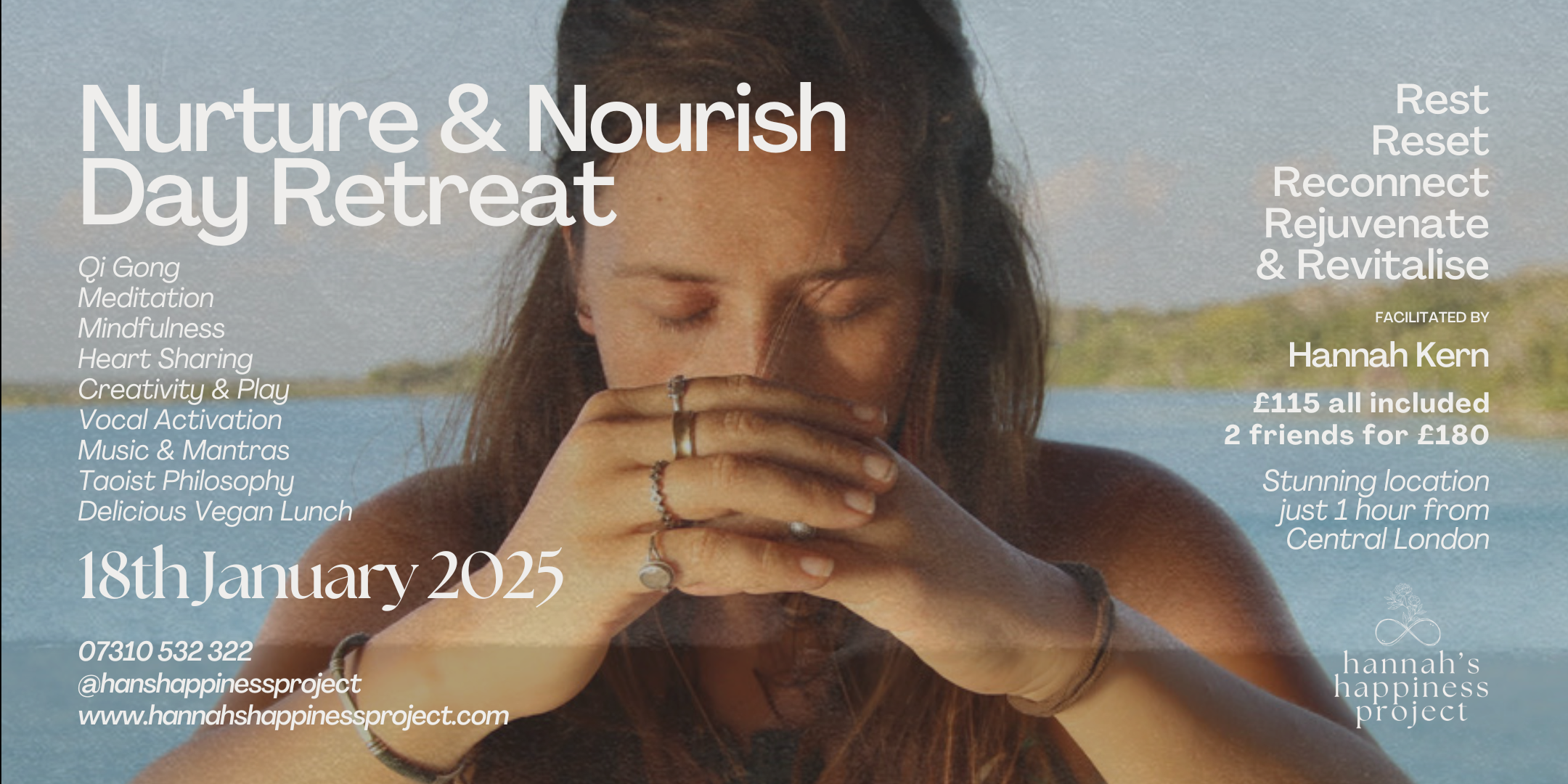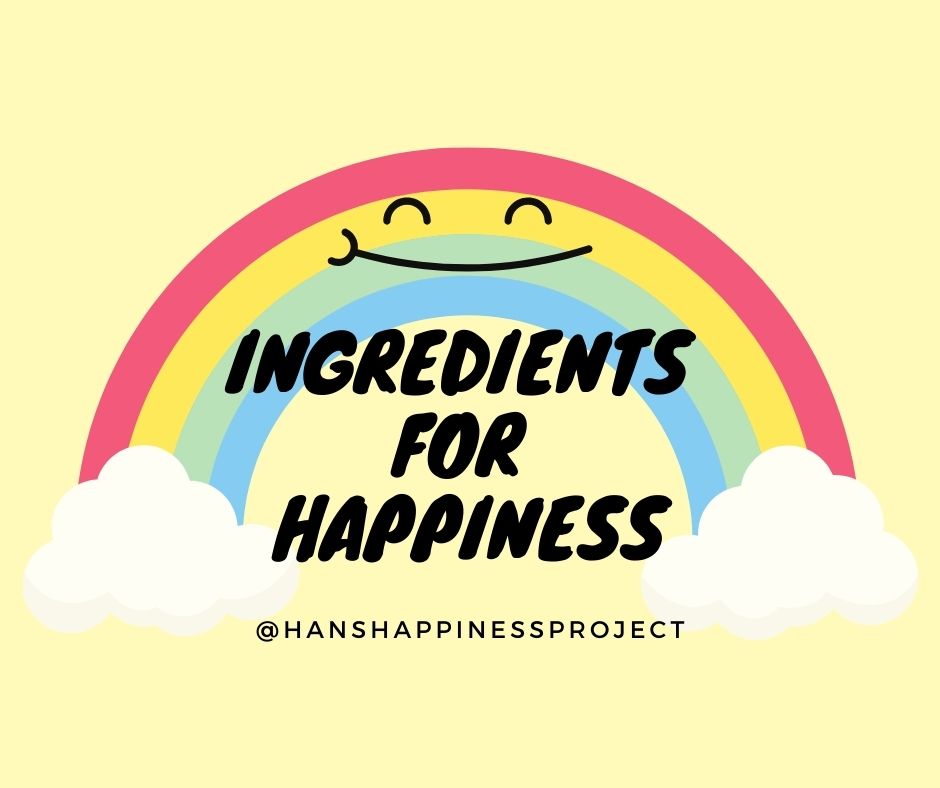
✨ 𝗥𝗘𝗦𝗧 • 𝗥𝗘𝗦𝗘𝗧• 𝗥𝗘𝗖𝗢𝗡𝗡𝗘𝗖𝗧 • 𝗥𝗘𝗝𝗨𝗩𝗘𝗡𝗔𝗧𝗘 • 𝗥𝗘𝗩𝗜𝗧𝗔𝗟𝗜𝗦𝗘 ✨
Start the new year by shifting the January blues and reconnecting with your inner vitality. Escape the hustle of everyday life and immerse yourself in a serene, supportive space where you can truly unwind, go deeper within and rediscover your joy.
𝗙𝗮𝗰𝗶𝗹𝗶𝘁𝗮𝘁𝗲𝗱 𝗯𝘆 𝗛𝗮𝗻𝗻𝗮𝗵 𝗞𝗲𝗿𝗻 – 𝘏𝘢𝘱𝘱𝘪𝘯𝘦𝘴𝘴 𝘙𝘦𝘴𝘦𝘢𝘳𝘤𝘩𝘦𝘳, 𝘔𝘦𝘯𝘵𝘰𝘳 & 𝘛𝘌𝘋𝘹 𝘚𝘱𝘦𝘢𝘬𝘦𝘳, 𝘏𝘢𝘯𝘯𝘢𝘩 𝘣𝘳𝘪𝘯𝘨𝘴 𝘢 𝘸𝘦𝘢𝘭𝘵𝘩 𝘰𝘧 𝘦𝘹𝘱𝘦𝘳𝘪𝘦𝘯𝘤𝘦 𝘪𝘯 𝘸𝘦𝘭𝘭𝘯𝘦𝘴𝘴, 𝘦𝘯𝘦𝘳𝘨𝘺 𝘸𝘰𝘳𝘬 𝘢𝘯𝘥 𝘮𝘪𝘯𝘥𝘧𝘶𝘭𝘯𝘦𝘴𝘴 𝘵𝘰 𝘨𝘶𝘪𝘥𝘦 𝘺𝘰𝘶 𝘵𝘩𝘳𝘰𝘶𝘨𝘩 𝘵𝘩𝘪𝘴 𝘵𝘳𝘢𝘯𝘴𝘧𝘰𝘳𝘮𝘢𝘵𝘪𝘷𝘦 𝘳𝘦𝘵𝘳𝘦𝘢𝘵 𝘥𝘢𝘺.
𝗧𝗛𝗜𝗦 𝗜𝗠𝗠𝗘𝗥𝗦𝗜𝗩𝗘 𝗗𝗔𝗬 𝗥𝗘𝗧𝗥𝗘𝗔𝗧 𝗢𝗙𝗙𝗘𝗥𝗦
☯️ 𝗤𝗶 𝗚𝗼𝗻𝗴 – 𝘏𝘢𝘳𝘯𝘦𝘴𝘴 𝘵𝘩𝘦 𝘱𝘰𝘸𝘦𝘳 𝘰𝘧 𝘦𝘯𝘦𝘳𝘨𝘺 𝘧𝘭𝘰𝘸 𝘵𝘰 𝘤𝘶𝘭𝘵𝘪𝘷𝘢𝘵𝘦 𝘴𝘵𝘳𝘦𝘯𝘨𝘵𝘩, 𝘣𝘢𝘭𝘢𝘯𝘤𝘦 𝘢𝘯𝘥 𝘪𝘯𝘯𝘦𝘳 𝘱𝘦𝘢𝘤𝘦.
🧘🏽♀️ 𝗠𝗲𝗱𝗶𝘁𝗮𝘁𝗶𝗼𝗻 & 𝗠𝗶𝗻𝗱𝗳𝘂𝗹𝗻𝗲𝘀𝘀 – 𝘊𝘢𝘭𝘮 𝘺𝘰𝘶𝘳 𝘮𝘪𝘯𝘥, 𝘥𝘦𝘦𝘱𝘦𝘯 𝘺𝘰𝘶𝘳 𝘢𝘸𝘢𝘳𝘦𝘯𝘦𝘴𝘴 𝘢𝘯𝘥 𝘳𝘦𝘤𝘰𝘯𝘯𝘦𝘤𝘵 𝘸𝘪𝘵𝘩 𝘵𝘩𝘦 𝘱𝘳𝘦𝘴𝘦𝘯𝘵 𝘮𝘰𝘮𝘦𝘯𝘵.
💓 𝗛𝗲𝗮𝗿𝘁 𝗦𝗵𝗮𝗿𝗶𝗻𝗴 – 𝘖𝘱𝘦𝘯 𝘺𝘰𝘶𝘳 𝘩𝘦𝘢𝘳𝘵 𝘪𝘯 𝘢 𝘴𝘢𝘧𝘦 𝘢𝘯𝘥 𝘭𝘰𝘷𝘪𝘯𝘨 𝘴𝘱𝘢𝘤𝘦, 𝘧𝘰𝘴𝘵𝘦𝘳𝘪𝘯𝘨 𝘮𝘦𝘢𝘯𝘪𝘯𝘨𝘧𝘶𝘭 𝘤𝘰𝘯𝘯𝘦𝘤𝘵𝘪𝘰𝘯𝘴 𝘸𝘪𝘵𝘩 𝘰𝘵𝘩𝘦𝘳𝘴.
🎨 𝗖𝗿𝗲𝗮𝘁𝗶𝘃𝗶𝘁𝘆 & 𝗣𝗹𝗮𝘆 – 𝘙𝘦𝘢𝘸𝘢𝘬𝘦𝘯 𝘺𝘰𝘶𝘳 𝘤𝘩𝘪𝘭𝘥𝘭𝘪𝘬𝘦 𝘸𝘰𝘯𝘥𝘦𝘳 𝘵𝘩𝘳𝘰𝘶𝘨𝘩 𝘫𝘰𝘺𝘧𝘶𝘭, 𝘤𝘳𝘦𝘢𝘵𝘪𝘷𝘦 𝘦𝘹𝘱𝘳𝘦𝘴𝘴𝘪𝘰𝘯.
🎶 𝗩𝗼𝗰𝗮𝗹 𝗔𝗰𝘁𝗶𝘃𝗮𝘁𝗶𝗼𝗻, 𝗠𝘂𝘀𝗶𝗰 & 𝗠𝗮𝗻𝘁𝗿𝗮𝘀 – 𝘜𝘯𝘭𝘰𝘤𝘬 𝘺𝘰𝘶𝘳 𝘷𝘰𝘪𝘤𝘦, 𝘳𝘦𝘭𝘦𝘢𝘴𝘦 𝘦𝘮𝘰𝘵𝘪𝘰𝘯𝘢𝘭 𝘣𝘭𝘰𝘤𝘬𝘴 𝘢𝘯𝘥 𝘦𝘮𝘣𝘳𝘢𝘤𝘦 𝘺𝘰𝘶𝘳 𝘢𝘶𝘵𝘩𝘦𝘯𝘵𝘪𝘤 𝘴𝘦𝘭𝘧 𝘸𝘪𝘵𝘩 𝘶𝘱𝘭𝘪𝘧𝘵𝘪𝘯𝘨 𝘮𝘦𝘭𝘰𝘥𝘪𝘦𝘴 𝘢𝘯𝘥 𝘦𝘮𝘱𝘰𝘸𝘦𝘳𝘪𝘯𝘨 𝘤𝘩𝘢𝘯𝘵𝘴.
🪷 𝗧𝗮𝗼𝗶𝘀𝘁 𝗣𝗵𝗶𝗹𝗼𝘀𝗼𝗽𝗵𝘆 – 𝘋𝘪𝘴𝘤𝘰𝘷𝘦𝘳 𝘵𝘪𝘮𝘦𝘭𝘦𝘴𝘴 𝘸𝘪𝘴𝘥𝘰𝘮 𝘵𝘰 𝘪𝘯𝘴𝘱𝘪𝘳𝘦 𝘣𝘢𝘭𝘢𝘯𝘤𝘦, 𝘩𝘢𝘳𝘮𝘰𝘯𝘺 𝘢𝘯𝘥 𝘷𝘪𝘵𝘢𝘭𝘪𝘵𝘺 𝘪𝘯 𝘺𝘰𝘶𝘳 𝘥𝘢𝘪𝘭𝘺 𝘭𝘪𝘧𝘦.
📸 𝗣𝗵𝗼𝘁𝗼𝘀, 𝗩𝗶𝗱𝗲𝗼𝘀, 𝗙𝗿𝗶𝗲𝗻𝗱𝘀𝗵𝗶𝗽 & 𝗠𝗲𝗺𝗼𝗿𝗶𝗲𝘀 – 𝘠𝘰𝘶 𝘸𝘪𝘭𝘭 𝘳𝘦𝘤𝘦𝘪𝘷𝘦 𝘴𝘰𝘮𝘦 𝘣𝘦𝘢𝘶𝘵𝘪𝘧𝘶𝘭 𝘱𝘩𝘰𝘵𝘰𝘴 & 𝘷𝘪𝘥𝘦𝘰𝘴 𝘵𝘰 𝘧𝘰𝘳𝘦𝘷𝘦𝘳 𝘤𝘩𝘦𝘳𝘪𝘴𝘩 𝘧𝘳𝘰𝘮 𝘢 𝘩𝘦𝘢𝘳𝘵-𝘸𝘢𝘳𝘮𝘪𝘯𝘨 𝘢𝘯𝘥 𝘮𝘦𝘮𝘰𝘳𝘢𝘣𝘭𝘦 𝘥𝘢𝘺!
And to 𝗻𝗼𝘂𝗿𝗶𝘀𝗵 𝘆𝗼𝘂𝗿 𝗯𝗼𝗱𝘆:
🍃 𝘈 𝘥𝘦𝘭𝘪𝘤𝘪𝘰𝘶𝘴, 𝘱𝘭𝘢𝘯𝘵-𝘣𝘢𝘴𝘦𝘥 𝘭𝘶𝘯𝘤𝘩 𝘤𝘢𝘳𝘦𝘧𝘶𝘭𝘭𝘺 𝘤𝘳𝘢𝘧𝘵𝘦𝘥 𝘵𝘰 𝘴𝘶𝘱𝘱𝘰𝘳𝘵 𝘺𝘰𝘶𝘳 𝘦𝘯𝘦𝘳𝘨𝘺 𝘢𝘯𝘥 𝘸𝘦𝘭𝘭𝘣𝘦𝘪𝘯𝘨.
***𝗙𝗨𝗟𝗟 𝗥𝗘𝗧𝗥𝗘𝗔𝗧 𝗣𝗥𝗢𝗚𝗥𝗔𝗠𝗠𝗘 𝗪𝗜𝗟𝗟 𝗕𝗘 𝗔𝗩𝗔𝗜𝗟𝗔𝗕𝗟𝗘 𝗙𝗥𝗢𝗠 𝗧𝗛𝗘 𝟭𝟰𝗧𝗛 𝗗𝗘𝗖𝗘𝗠𝗕𝗘𝗥***
𝗬𝗢𝗨𝗥 𝗘𝗫𝗣𝗘𝗥𝗜𝗘𝗡𝗖𝗘
𝘏𝘦𝘭𝘥 𝘪𝘯 𝘢 𝘴𝘵𝘶𝘯𝘯𝘪𝘯𝘨, 𝘵𝘳𝘢𝘯𝘲𝘶𝘪𝘭 𝘭𝘰𝘤𝘢𝘵𝘪𝘰𝘯 𝘫𝘶𝘴𝘵 𝘰𝘯𝘦 𝘩𝘰𝘶𝘳 𝘧𝘳𝘰𝘮 𝘊𝘦𝘯𝘵𝘳𝘢𝘭 𝘓𝘰𝘯𝘥𝘰𝘯, 𝘵𝘩𝘪𝘴 𝘳𝘦𝘵𝘳𝘦𝘢𝘵 𝘪𝘴 𝘥𝘦𝘴𝘪𝘨𝘯𝘦𝘥 𝘵𝘰 𝘩𝘦𝘭𝘱 𝘺𝘰𝘶:
✨ Connect deeply with yourself and like-minded people
✨ Embrace your inner child through play and creative flow
✨ Work with your energy to release stored tension and trauma
✨ Feel seen, supported and rejuvenated in a loving community
✨ Indulge in your happiness and prioritise self-care
𝗜𝗡𝗩𝗘𝗦𝗧 𝗜𝗡 𝗬𝗢𝗨𝗥 𝗛𝗔𝗣𝗣𝗜𝗡𝗘𝗦𝗦
• 𝗘𝗮𝗿𝗹𝘆-𝗯𝗶𝗿𝗱 𝗱𝗶𝘀𝗰𝗼𝘂𝗻𝘁: £95 𝘱𝘦𝘳 𝘱𝘦𝘳𝘴𝘰𝘯 (𝘣𝘰𝘰𝘬 𝘣𝘦𝘧𝘰𝘳𝘦 14𝘵𝘩 𝘋𝘦𝘤𝘦𝘮𝘣𝘦𝘳)
• 𝙎𝙩𝙖𝙣𝙙𝙖𝙧𝙙: £115 𝘱𝘦𝘳 𝘱𝘦𝘳𝘴𝘰𝘯
• 𝗕𝗿𝗶𝗻𝗴 𝗮 𝗳𝗿𝗶𝗲𝗻𝗱: 2 𝘧𝘰𝘳 £180
• 𝗗𝗲𝗽𝗼𝘀𝗶𝘁𝘀 𝗮𝘃𝗮𝗶𝗹𝗮𝗯𝗹𝗲
𝑨𝒍𝒍 𝒕𝒊𝒄𝒌𝒆𝒕𝒔 𝒊𝒏𝒄𝒍𝒖𝒅𝒆 𝒍𝒖𝒏𝒄𝒉. Spaces are limited – reserve your place today!
𝑻𝒉𝒆 𝑵𝒖𝒓𝒕𝒖𝒓𝒆 & 𝑵𝒐𝒖𝒓𝒊𝒔𝒉 𝑫𝒂𝒚 𝑹𝒆𝒕𝒓𝒆𝒂𝒕 will strip back your familiar frameworks and allow you to heal with openness, realness and heart-centred happiness. Give yourself the gift of rest, renewal and reconnection to start your year off with a loving intention.
📞 𝗖𝗢𝗡𝗧𝗔𝗖𝗧 𝗙𝗢𝗥 𝗠𝗢𝗥𝗘 𝗜𝗡𝗙𝗢 & 𝗧𝗢 𝗕𝗢𝗢𝗞 𝗗𝗜𝗥𝗘𝗖𝗧𝗟𝗬 𝗪𝗜𝗧𝗛𝗢𝗨𝗧 𝗙𝗘𝗘𝗦
www.hannahshappinessproject.com
𝗧𝗘𝗦𝗧𝗜𝗠𝗢𝗡𝗜𝗔𝗟𝗦
“𝘉𝘦𝘢𝘶𝘵𝘪𝘧𝘶𝘭 𝘢𝘯𝘥 𝘵𝘳𝘢𝘯𝘴𝘧𝘰𝘳𝘮𝘢𝘵𝘪𝘷𝘦. 𝘏𝘢𝘯𝘯𝘢𝘩 𝘩𝘢𝘴 𝘩𝘦𝘭𝘱𝘦𝘥 𝘮𝘦 𝘵𝘰 𝘳𝘦𝘤𝘰𝘯𝘯𝘦𝘤𝘵 𝘵𝘰 𝘮𝘺 𝘣𝘰𝘥𝘺 𝘴𝘰 𝘵𝘩𝘢𝘵 𝘐 𝘢𝘮 𝘢𝘸𝘢𝘳𝘦 𝘰𝘧 𝘧𝘦𝘦𝘭𝘪𝘯𝘨 𝘢𝘯𝘥 𝘦𝘹𝘱𝘦𝘳𝘪𝘦𝘯𝘤𝘪𝘯𝘨 𝘢𝘴 𝘸𝘦𝘭𝘭 𝘢𝘴 𝘵𝘩𝘪𝘯𝘬𝘪𝘯𝘨. 𝘔𝘰𝘷𝘪𝘯𝘨 𝘣𝘦𝘺𝘰𝘯𝘥 𝘢𝘸𝘢𝘳𝘦𝘯𝘦𝘴𝘴, 𝘐’𝘷𝘦 𝘭𝘦𝘢𝘳𝘯𝘵 𝘸𝘰𝘯𝘥𝘦𝘳𝘧𝘶𝘭, 𝘤𝘢𝘭𝘮𝘪𝘯𝘨 𝘘𝘪 𝘎𝘰𝘯𝘨 𝘳𝘰𝘶𝘵𝘪𝘯𝘦𝘴 𝘢𝘯𝘥 𝘰𝘵𝘩𝘦𝘳 𝘮𝘦𝘥𝘪𝘵𝘢𝘵𝘪𝘰𝘯 𝘵𝘦𝘤𝘩𝘯𝘪𝘲𝘶𝘦𝘴 𝘵𝘩𝘢𝘵 𝘩𝘦𝘭𝘱 𝘮𝘦 𝘵𝘰 𝘳𝘦𝘴𝘦𝘵 𝘢𝘯𝘥 𝘳𝘦𝘭𝘢𝘹. 𝘐’𝘥 𝘩𝘪𝘨𝘩𝘭𝘺 𝘳𝘦𝘤𝘰𝘮𝘮𝘦𝘯𝘥 𝘏𝘢𝘯𝘯𝘢𝘩 𝘵𝘰 𝘢𝘯𝘺𝘰𝘯𝘦 𝘴𝘦𝘦𝘬𝘪𝘯𝘨 𝘢 𝘧𝘳𝘦𝘴𝘩 𝘢𝘯𝘥 𝘪𝘮𝘱𝘢𝘤𝘵𝘧𝘶𝘭 𝘸𝘢𝘺 𝘰𝘧 𝘳𝘦𝘯𝘦𝘸𝘪𝘯𝘨 𝘢𝘯𝘥 𝘳𝘦𝘧𝘳𝘦𝘴𝘩𝘪𝘯𝘨 𝘵𝘩𝘦𝘪𝘳 𝘣𝘰𝘥𝘺, 𝘮𝘪𝘯𝘥 𝘢𝘯𝘥 𝘴𝘱𝘪𝘳𝘪𝘵”
𝑱𝒖𝒍𝒊𝒆
“𝘏𝘢𝘯𝘯𝘢𝘩 𝘩𝘦𝘭𝘥 𝘴𝘱𝘢𝘤𝘦 𝘧𝘰𝘳 𝘶𝘴 𝘢𝘭𝘭 𝘮𝘢𝘬𝘪𝘯𝘨 𝘶𝘴 𝘧𝘦𝘦𝘭 𝘭𝘰𝘷𝘦𝘥 𝘢𝘯𝘥 𝘤𝘩𝘦𝘳𝘪𝘴𝘩𝘦𝘥, 𝘢𝘯𝘥 𝘩𝘦𝘭𝘱𝘦𝘥 𝘮𝘦 𝘵𝘰 ‘𝘧𝘦𝘦𝘭 𝘦𝘯𝘦𝘳𝘨𝘺’ 𝘧𝘰𝘳 𝘵𝘩𝘦 𝘧𝘪𝘳𝘴𝘵 𝘵𝘪𝘮𝘦, 𝘢𝘯𝘥 𝘢 𝘭𝘰𝘷𝘦𝘭𝘺 𝘴𝘦𝘯𝘴𝘦 𝘰𝘧 𝘤𝘢𝘭𝘮 𝘢𝘯𝘥 𝘨𝘳𝘢𝘵𝘪𝘵𝘶𝘥𝘦 𝘧𝘰𝘳 𝘴𝘪𝘮𝘱𝘭𝘺 ‘𝘣𝘦𝘪𝘯𝘨’. 𝘛𝘰 𝘦𝘯𝘥 𝘐 𝘸𝘢𝘴 𝘢𝘵 𝘵𝘩𝘦 𝘤𝘦𝘯𝘵𝘳𝘦 𝘰𝘧 𝘢𝘯 𝘦𝘯𝘦𝘳𝘨𝘺 𝘤𝘪𝘳𝘤𝘭𝘦, 𝘸𝘩𝘦𝘳𝘦 𝘦𝘷𝘦𝘳𝘺𝘰𝘯𝘦 𝘪𝘯 𝘵𝘩𝘦 𝘴𝘦𝘯𝘵 𝘵𝘩𝘦𝘳𝘦 𝘪𝘯𝘤𝘳𝘦𝘥𝘪𝘣𝘭𝘦 𝘦𝘯𝘦𝘳𝘨𝘺 𝘵𝘰 𝘮𝘦, 𝘸𝘩𝘪𝘤𝘩 𝘸𝘢𝘴 𝘢 𝘣𝘦𝘢𝘶𝘵𝘪𝘧𝘶𝘭 𝘵𝘩𝘪𝘯𝘨 𝘢𝘯𝘥 𝘷𝘦𝘳𝘺 𝘦𝘮𝘰𝘵𝘪𝘰𝘯𝘢𝘭. 𝘐 𝘸𝘢𝘴 𝘢𝘭𝘴𝘰 𝘨𝘪𝘷𝘦𝘯 𝘢 𝘨𝘪𝘧𝘵 𝘵𝘰 𝘵𝘢𝘬𝘦 𝘢𝘸𝘢𝘺: 𝘢 𝘤𝘢𝘳𝘥 𝘸𝘪𝘵𝘩 𝘴𝘦𝘦𝘥𝘴 𝘪𝘯 𝘵𝘰 𝘱𝘭𝘢𝘯𝘵 𝘪𝘯 𝘮𝘺 𝘰𝘸𝘯 𝘸𝘰𝘳𝘥𝘴 𝘮𝘺 𝘩𝘰𝘱𝘦𝘴 𝘢𝘯𝘥 𝘥𝘳𝘦𝘢𝘮𝘴 𝘵𝘰 𝘣𝘭𝘰𝘴𝘴𝘰𝘮. 𝘏𝘢𝘯𝘯𝘢𝘩 𝘳𝘦𝘢𝘭𝘭𝘺 𝘥𝘰𝘦𝘴 𝘦𝘮𝘣𝘰𝘥𝘺 ‘𝘏𝘢𝘱𝘱𝘪𝘯𝘦𝘴𝘴’ …𝘵𝘩𝘢𝘯𝘬 𝘺𝘰𝘶 𝘢𝘯𝘥 𝘣𝘭𝘦𝘴𝘴𝘪𝘯𝘨𝘴”
𝑫𝒂𝒏𝒊𝒆𝒍
“𝘐’𝘮 𝘯𝘦𝘸 𝘵𝘰 𝘘𝘪 𝘎𝘰𝘯𝘨 𝘢𝘯𝘥 𝘴𝘰 𝘱𝘭𝘦𝘢𝘴𝘦𝘥 𝘵𝘰 𝘣𝘦 𝘭𝘦𝘢𝘳𝘯𝘪𝘯𝘨 𝘸𝘪𝘵𝘩 𝘏𝘢𝘯𝘯𝘢𝘩. 𝘚𝘩𝘦 𝘨𝘪𝘷𝘦𝘴 𝘶𝘴 𝘴𝘰 𝘮𝘶𝘤𝘩 𝘮𝘰𝘳𝘦! 𝘚𝘩𝘦 𝘸𝘢𝘳𝘮𝘭𝘺 𝘢𝘯𝘥 𝘤𝘭𝘦𝘢𝘳𝘭𝘺 𝘨𝘶𝘪𝘥𝘦𝘴 𝘶𝘴 𝘵𝘩𝘳𝘰𝘶𝘨𝘩 𝘦𝘷𝘦𝘳𝘺 𝘦𝘭𝘦𝘮𝘦𝘯𝘵 𝘸𝘩𝘪𝘤𝘩 𝘳𝘦𝘢𝘭𝘭𝘺 𝘩𝘦𝘭𝘱𝘴 𝘶𝘴 𝘵𝘰 𝘧𝘦𝘦𝘭 𝘵𝘰𝘵𝘢𝘭𝘭𝘺 𝘱𝘳𝘦𝘴𝘦𝘯𝘵 𝘸𝘪𝘵𝘩 𝘩𝘦𝘳 𝘢𝘯𝘥 𝘰𝘶𝘳𝘴𝘦𝘭𝘷𝘦𝘴. 𝘈𝘵 𝘵𝘩𝘦 𝘦𝘯𝘥 𝘐 𝘧𝘦𝘦𝘭 𝘥𝘦𝘦𝘱𝘭𝘺 𝘤𝘢𝘭𝘮 𝘢𝘯𝘥 𝘱𝘦𝘢𝘤𝘦𝘧𝘶𝘭. 𝘐’𝘮 𝘴𝘰 𝘨𝘭𝘢𝘥 𝘐 𝘨𝘪𝘷𝘦 𝘮𝘺𝘴𝘦𝘭𝘧 𝘵𝘩𝘢𝘵 𝘢𝘯𝘥 𝘨𝘳𝘢𝘵𝘦𝘧𝘶𝘭 𝘵𝘰 𝘏𝘢𝘯𝘯𝘢𝘩 𝘧𝘰𝘳 𝘣𝘦𝘪𝘯𝘨 𝘴𝘶𝘤𝘩 𝘢 𝘸𝘰𝘯𝘥𝘦𝘳𝘧𝘶𝘭 𝘧𝘢𝘤𝘪𝘭𝘪𝘵𝘢𝘵𝘰𝘳. 𝘛𝘩𝘢𝘯𝘬 𝘺𝘰𝘶!”
𝘾𝙡𝙖𝙞𝙧𝙚





